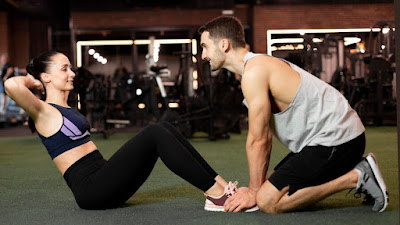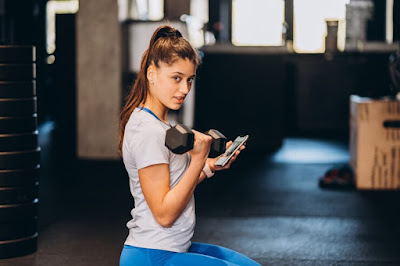Are you considering starting your fitness journey but feeling overwhelmed by the variety of gym exercises available? Don't worry; you're not alone. Beginning a workout routine can be intimidating, especially with the multitude of options out there. However, taking the first step towards a healthier lifestyle doesn't have to be daunting. With the right guidance and exercise selection, you can embark on your fitness journey with confidence and ease.
Benefits of Gym Exercises for Beginners
Before delving into specific exercises, let's understand why incorporating gym exercises into your routine is beneficial, especially for beginners. Gym exercises offer a myriad of advantages, both physical and mental. Physically, regular exercise helps improve cardiovascular health, build strength and endurance, and enhance flexibility. Mentally, it reduces stress, boosts mood, and promotes better sleep. Additionally, engaging in gym activities provides an opportunity to socialize and connect with like-minded individuals, fostering a sense of community and support.
Understanding the Beginner's Perspective
As a beginner, it's natural to have concerns and fears about starting a gym routine. Common worries include feeling self-conscious about one's appearance or abilities, fear of judgment from others, or uncertainty about where to begin. However, it's essential to recognize that everyone starts somewhere, and every fitness journey is unique. By acknowledging and addressing these concerns, beginners can approach their workouts with a positive mindset and greater confidence.
Choosing the Right Gym Exercises
Selecting the appropriate exercises is crucial, especially for beginners. It's essential to opt for exercises that are safe, effective, and tailored to individual fitness levels and goals. Factors to consider include one's current fitness level, any pre-existing medical conditions or injuries, personal preferences, and long-term objectives. By choosing the right exercises, beginners can minimize the risk of injury and maximize their progress and enjoyment.
Warm-up Exercises
Before diving into more intense workouts, it's essential to prepare the body with proper warm-up exercises. Warm-ups help increase blood flow to the muscles, improve flexibility, and reduce the risk of injury. Examples of effective warm-up exercises include light jogging, jumping jacks, arm circles, and leg swings.
Strength Training Exercises
Strength training is a vital component of any workout routine, especially for beginners. It helps build muscle mass, increase metabolism, and improve overall strength and endurance. Beginner-friendly strength exercises include bodyweight exercises such as squats, lunges, push-ups, and dumbbell exercises like bicep curls and overhead presses.
Cardiovascular Exercises
Cardiovascular exercises are essential for improving heart health, burning calories, and increasing stamina. Beginner-friendly cardio exercises include walking, cycling, swimming, and elliptical training. Aim for at least 30 minutes of moderate-intensity cardio most days of the week to reap the full benefits.
Flexibility Exercises
Flexibility exercises are often overlooked but are crucial for maintaining mobility and preventing injuries. Incorporate stretching exercises into your routine to improve flexibility and range of motion. Examples include yoga poses, Pilates, and dynamic stretches like leg swings and arm circles.
Safety Tips for Beginners
When starting a gym routine, safety should always be a top priority. To minimize the risk of injury, beginners should:
- Start slowly and gradually increase intensity.
- Focus on proper form and technique.
- Listen to their bodies and rest when needed.
- Stay hydrated and fuel their bodies with nutritious food.
- Seek guidance from a qualified fitness instructor or personal trainer.
Creating a Beginner's Workout Routine
Designing a structured workout plan is essential for staying consistent and achieving fitness goals. A well-rounded routine should include a mix of warm-up, strength training, cardiovascular, and flexibility exercises. Start with manageable goals and gradually increase intensity and duration as fitness levels improve.
Tracking Progress
Monitoring progress is essential for staying motivated and gauging the effectiveness of your workout routine. Keep track of key metrics such as weight, body measurements, strength gains, and endurance levels. Use tools like fitness apps, journals, or progress photos to document your journey and celebrate your achievements along the way.
Common Mistakes to Avoid
As a beginner, it's easy to fall into common pitfalls that can hinder progress or lead to injury. Some common mistakes to avoid include:
- Overtraining or pushing too hard, too soon.
- Neglecting proper warm-up and cool-down routines.
- Focusing solely on one type of exercise and neglecting others.
- Comparing oneself to others and feeling discouraged.
- Skipping rest days or ignoring signs of fatigue or injury.
Staying Motivated
Maintaining motivation is key to sticking with a workout routine long-term. Find activities you enjoy and mix up your workouts to keep things interesting. Set realistic goals and celebrate small victories along the way. Surround yourself with supportive friends or join group classes to stay accountable and motivated.
Building a Support System
Embarking on a fitness journey can sometimes feel lonely, especially for beginners. However, surrounding yourself with a supportive community can make all the difference in staying motivated and accountable. Consider joining group fitness classes or finding a workout buddy with similar goals. Having someone to share your successes and challenges with can provide encouragement and keep you on track towards your fitness goals.
Exploring Alternative Workouts
While traditional gym exercises like weightlifting and cardio machines are popular choices for beginners, don't be afraid to explore alternative workouts that suit your interests and preferences. Activities like dancing, hiking, rock climbing, or martial arts can provide a fun and effective way to stay active while challenging your body in new ways. The key is to find activities that you enjoy and look forward to doing regularly.
Mind-Body Connection
In addition to physical exercise, incorporating practices that nurture the mind-body connection can enhance your overall well-being. Activities like yoga, tai chi, or meditation can help reduce stress, improve focus and concentration, and promote relaxation. These practices can complement your gym workouts by providing a holistic approach to health and fitness.
Nutrition and Hydration
Exercise alone is not enough to achieve your fitness goals; proper nutrition and hydration are equally important. Fuel your body with a balanced diet rich in fruits, vegetables, lean proteins, whole grains, and healthy fats. Stay hydrated by drinking plenty of water throughout the day, especially before, during, and after your workouts. Avoid sugary drinks and processed foods, as they can hinder your progress and leave you feeling sluggish.
Overcoming Plateaus
At some point in your fitness journey, you may experience plateaus where progress seems to stall or slow down. Don't be discouraged; plateaus are a natural part of the process and can be overcome with patience and perseverance. Try mixing up your workouts by incorporating new exercises, increasing the intensity or duration of your workouts, or seeking guidance from a fitness professional. Remember that progress is not always linear, and small setbacks are opportunities for growth and improvement.
Rest and Recovery
Rest and recovery are essential components of any fitness routine, especially for beginners. Allow your body time to recover between workouts to prevent overtraining and reduce the risk of injury. Aim for at least one to two rest days per week, during which you can engage in low-impact activities like walking, stretching, or gentle yoga. Prioritize quality sleep to support muscle repair and regeneration, as well as overall health and well-being.
Setting SMART Goals
When setting fitness goals, it's essential to make them specific, measurable, achievable, relevant, and time-bound (SMART). Instead of vague goals like "lose weight" or "get in shape," try setting specific targets such as "lose 10 pounds in three months" or "run a 5K race in six weeks." Break down larger goals into smaller, manageable steps and track your progress along the way. Celebrate your achievements and adjust your goals as needed to stay motivated and focused.
Seeking Professional Guidance
If you're unsure where to start or how to progress in your fitness journey, consider seeking guidance from a qualified fitness professional. Personal trainers or fitness coaches can assess your current fitness level, discuss your goals and preferences, and design a personalized workout plan tailored to your needs. They can also provide instruction on proper exercise technique, offer motivation and support, and help you navigate any challenges or setbacks along the way.
Staying Consistent
Consistency is key to achieving long-term success in fitness. Make exercise a regular part of your routine by scheduling workouts at the same time each day or week and treating them like appointments you can't miss. Find ways to stay accountable, whether it's by tracking your workouts in a journal, using a fitness app, or sharing your progress with a friend or trainer. Remember that every workout, no matter how small, brings you one step closer to your goals.
Conclusion
Embarking on a fitness journey as a beginner can be both exciting and challenging. By incorporating a variety of exercises, building a support system, prioritizing nutrition and recovery, and staying consistent, you can set yourself up for success and achieve your fitness goals. Remember that progress takes time, and it's essential to be patient and kind to yourself along the way. With dedication, perseverance, and a positive mindset, you can transform your health and well-being and enjoy the benefits of a fit and active lifestyle.
FAQs:
What are the best gym exercises for beginners?
The best exercises for beginners include a mix of warm-up exercises, strength training, cardiovascular activities, and flexibility exercises.
How often should beginners work out at the gym?
Beginners should aim to work out at least three to four times per week, allowing for rest days in between to allow muscles to recover and prevent overtraining.
Can beginners do strength training exercises without weights?
Yes, beginners can start with bodyweight exercises like squats, lunges, and push-ups before progressing to exercises with weights.
How can beginners stay motivated to stick with their gym routine?
Beginners can stay motivated by setting realistic goals, finding activities they enjoy, seeking support from friends or trainers, and tracking their progress.
Is it necessary for beginners to warm up before exercising?
Yes, warming up before exercising is essential for increasing blood flow to the muscles, improving flexibility, and reducing the risk of injury.



